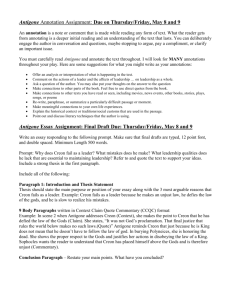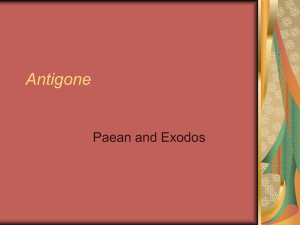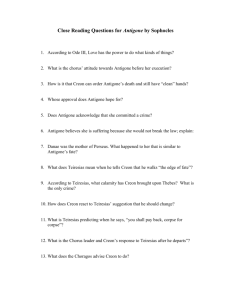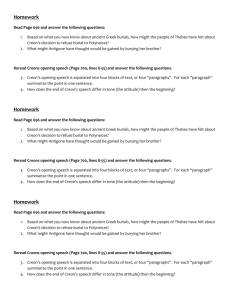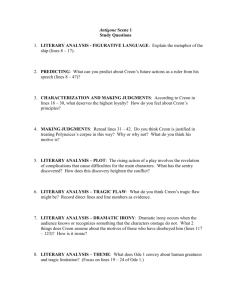ANSWER KEY SHORT ANSWER STUDY GUIDE QUESTIONS
advertisement
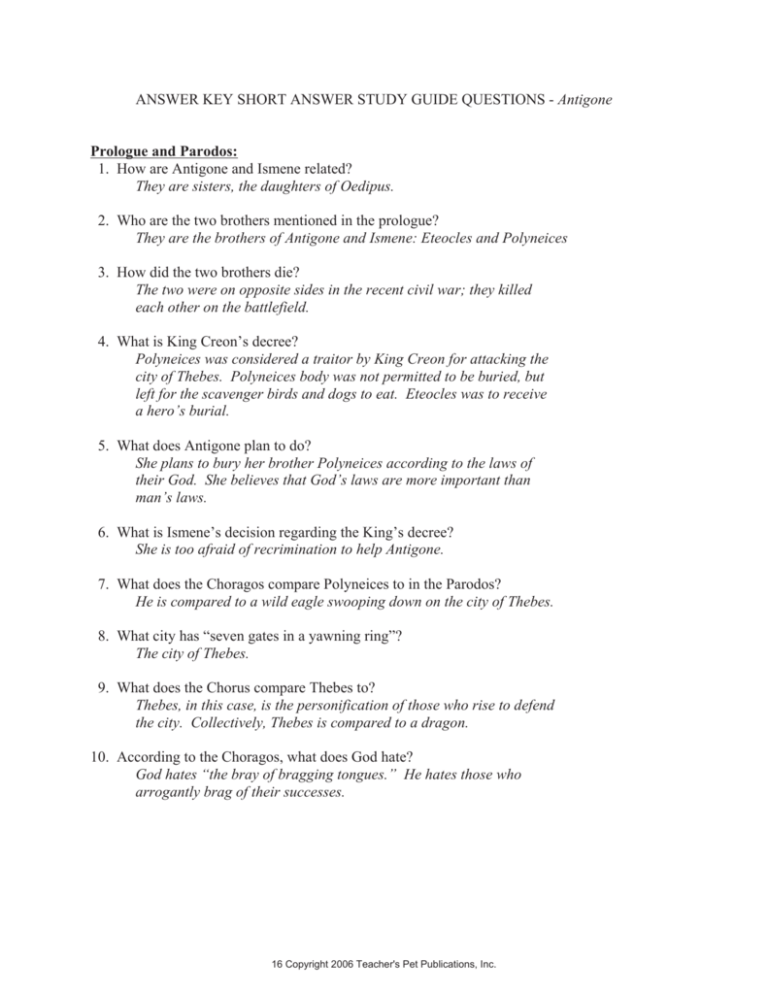
ANSWER KEY SHORT ANSWER STUDY GUIDE QUESTIONS - Antigone Prologue and Parodos: 1. How are Antigone and Ismene related? They are sisters, the daughters of Oedipus. 2. Who are the two brothers mentioned in the prologue? They are the brothers of Antigone and Ismene: Eteocles and Polyneices 3. How did the two brothers die? The two were on opposite sides in the recent civil war; they killed each other on the battlefield. 4. What is King Creon’s decree? Polyneices was considered a traitor by King Creon for attacking the city of Thebes. Polyneices body was not permitted to be buried, but left for the scavenger birds and dogs to eat. Eteocles was to receive a hero’s burial. 5. What does Antigone plan to do? She plans to bury her brother Polyneices according to the laws of their God. She believes that God’s laws are more important than man’s laws. 6. What is Ismene’s decision regarding the King’s decree? She is too afraid of recrimination to help Antigone. 7. What does the Choragos compare Polyneices to in the Parodos? He is compared to a wild eagle swooping down on the city of Thebes. 8. What city has “seven gates in a yawning ring”? The city of Thebes. 9. What does the Chorus compare Thebes to? Thebes, in this case, is the personification of those who rise to defend the city. Collectively, Thebes is compared to a dragon. 10. According to the Choragos, what does God hate? God hates “the bray of bragging tongues.” He hates those who arrogantly brag of their successes. 16 Copyright 2006 Teacher's Pet Publications, Inc. Scene 1 and Ode 1: 1. Who is the new King of Thebes? Creon, brother-in-law to Oedipus, is the new king of Thebes. 2. How did the new King of Thebes claim heir to the throne? Creon is the brother-in-law of the previous king, Oedipus. When Oedipus’ two sons were killed in battle, Creon was the next male in line for the throne. 3. What crime has Ployneices committed in the opinion of the king? Since Polyneices broke his exile and attacked the city of Thebes, Creon considers Polyneices a traitor. 4. What news does the sentry bring to Creon? Someone has secretly covered the body of Polyneices with just enough dirt to be considered as buried by the gods. His soul will now move to the Underworld. 5. How was it decided which of the sentries would bring the news about Polyneices to Creon? Since this is terribly bad news, no one wants to tell the king. The sentries end up throwing dice to decide who will tell Creon. 6. How does Creon believe the act of burying Polyneices was carried out? Creon believes that the sentries were paid off by his enemies and they were bribed to bury Polyneices’ body. 7. What does Creon demand that the sentry do? King Creon demands that the sentry bring him the man who broke his decree and buried a traitor. 8. According to Ode 1, what is the most wonderful of all the world’s wonders? Man is the most wonderful of all the world’s wonders. 9. Of all the winds, man has made himself secure against all except one. Which wind is that? Man has not secured himself against the wind of death. 10. List man’s accomplishments according to Ode 1. a. He conquered the seas. b. He planted and harvested the Earth. c. He has command over the creatures of the earth (birds and fish as well). d. He has created language. e. He has built shelters against the elements. f. He has created government. 17 Copyright 2006 Teacher's Pet Publications, Inc. Scene 2 and Ode 2: 1. Who has the sentry captured and brought before King Creon? The sentry brought Antigone, the king’s niece, to Creon. 2. How did the guards manage to capture Antigone? The sentries had gone back to Polyneices’ buried body and removed the dirt, thereby unburying it. They then sat back to watch who would come to bury it again. 3. How did Antigone react to being captured by the sentries? Antigone did not resist, but went with the sentries willingly. 4. What reason does Antigone give for defying Creon’s decree? Antigone believes that the laws of God concerning the burial of the dead are more important than any of man’s laws, including Creon’s. 5. Who else does Creon have arrested in connection with the crime of burying Polyneices? He arrests Antigone’s sister, Ismene in connection with the crime. 6. Why is Antigone angry with Ismene? Ismene wants to share in Antigone’s guilt and punishment for burying Polyneices, yet she had refused to help her sister bury their brother. 7. Besides being Antigone’s uncle, how else were Creon and Antigone related? Antigone was engaged to marry Creon’s son, Haimon. 8. What is to be Antigone’s punishment for burying her brother? Antigone will be put to death. 9. According to Ode 2, who is the fortunate man? The fortunate man is one “who has never tasted God’s vengeance.” 10. Who is the god who must not be made angry, according to Ode 2? Zeus must not be made angry or those who do will suffer his wrath. Scene 3 and Ode 3: 1. What is Haimon’s initial response when his father asks how he feels about the king’s decision to execute Antigone? Haimon says that he supports and obeys his father’s decisions. 2. What does Creon say that men pray for? Creon says that men pray for sons who are attentive and dutiful to their fathers. 18 Copyright 2006 Teacher's Pet Publications, Inc. 3. Why is Creon intent on harshly punishing, even family members, all those who break the law? Creon believes that his people will not obey or have respect for him if he is lenient with family members. 4. What does Haimon claim is God’s crowning gift to man? Haimon claims that the ability to reason is God’s crowning gift to man. 5. What does Haimon tell King Creon about the people of Thebes’ allegiance to him? Haimon tells his father that the people only obey him out of fear and that they will say whatever he wants to hear. 6. Whose point, King Creon’s or Haimon’s, does the Choragos support? The Choragos claims that both speak well. It is an effort to seek compromise. 7. How does the city feel about Antigone’s crime? Haimon claims that the city of Thebes does not view Antigone as a criminal. 8. While Creon is ranting at his son, what does the king threaten to do? Creon threatens to execute Antigone, Haimon’s fiancée, in front of him. 9. Describe Creon’s death sentence for Antigone. Creon will have Antigone locked in a stone vault out in the wilderness. She will be given some provisions of food, and if she is able to escape, then it will be because her gods took pity on her. 10. According to Ode 3, what is it that “even the pure Immortals cannot escape”? “Even the pure Immortals cannot escape” love. Scene 4 and Ode 4: 1. Whose fate does Antigone compare to her own? Antigone compares her fate to that of Niobe, Tantalos’ daughter. 2. What does Antigone beg the people of Thebes to bear witness to? She wants the town to bear witness to how she was denied pity and unjustly judged by Creon. 3. Who does Antigone blame for her terrible misfortune? She blames the sins of her father, Oedipus for her misfortune. 4. According to the chorus, what is considered a virtue? Reverence to the gods is considered a virtue. 19 Copyright 2006 Teacher's Pet Publications, Inc. 5. What does Creon sarcastically say would have man singing forever? Creon claims that if the singing of dirges and planned lamentations could put off death, men would sing forever. 6. According to Ode 4, who was locked away in a brazen vault? Danae was locked in a brazen vault. 7. Who came to the princess while she was locked away? Zeus came to Danae in her vault in the form of golden rain. 8. Who “bore the gods’ prisoning anger for his pride”? Dryas’ son 9. What is the “half remembered tale of horror” that old men tell? A king’s new woman, sick with hatred for the queen he had imprisoned, ripped out his two sons’ eyes with her bloody hands. 10. Who, as a child, had “raced with young colts on the glittering hills/And walked untrammeled in open light”? The daughter of the god of the North Wind was that child. She was also the mother of the two blinded boys. Scene 5: 1. Who is the blind prophet who comes to speak to King Creon? Teiresias is the blind prophet. 2. What does the prophet claim that he heard which frightened him? He heard birds screaming and he knew that they were fighting and tearing at each other. 3. What happened when the prophet began “the rites of burnt-offering at the altar”? Although Teiresias claimed that Hephaistos failed him because he could not start a fire on the altar, the fat from the animal’s thigh melted, the entrails dissolved, and bare bones burst forth from the body. 4. What does the prophet claim to be the cause of the gods’ reaction to their offerings? Creon has brought about the anger of the gods with his decree about Polyneices and now the animals offered for sacrifice are the same animals that have been eating of Polyneices’ body in the field. Because of this, the animals are unclean and not fit for sacrifice. 5. What does the prophet claim can be done to repair the evil performed against the gods? Creon is told that he can admit he was wrong and that he can make amends to the gods by burying Polyneices and by releasing Antigone. 20 Copyright 2006 Teacher's Pet Publications, Inc. 6. What is King Creon’s reaction to Teiresias’ message? Creon becomes angry with Teiresias and refuses to yield. 7. What is it that Creon claims all prophets love? Creon claims that all prophets love gold. 8. What warning does Teiresias give to King Creon if he refuses to heed the prophesies? Teiresias warns Creon that he shall have to “pay back/Corpse for corpse, flesh of [his] own flesh” as punishment for angering the gods. 9. What advice does the Choragos give King Creon once Teiresias leaves? The Choragos advises Creon to quickly “free Antigone from the vault/ And build a tomb for Polyneices” in order to appease the gods’ anger. 10. How does King Creon react to the advice of the Choragos? Creon finally admits to his pride and says that he himself will go to set Antigone free. Paean and Exodos: 1. The Choragos and the Chorus pray to a “God of many names.” What are some of these names? a. Iacchos, son of Kadmeian Semele b. Born of the Thunder c. Guardian of the West Regent of Eleusis’ plain d. Prince of Maenad Thebes and the Dragon Field e. Heavenly Child of Semele Bride of Thunderer f. Io Iacche 2. Who does the messenger claim is “a walking dead man”? King Creon is a walking dead man. 3. How has Teiresias’ prophecy that Creon would pay to the gods “flesh of [his] own flesh” come true? The messenger reports that Haimon, Creon’s son, has killed himself. 4. Who is Eurydice? She is Creon’s wife and the mother of Haimon. 5. What were Creon and the messenger doing when they prayed to Hecate and Pluto? Creon and the messenger were bathing the corpse of Polyneices with holy water before they burned what was left of it. They then “heaped up a towering barrow/Of earth of his own land” over the urn. 6. What did King Creon and the messenger do as soon as they finished their tasks regarding Polyneices? They hurried to the vault to set Antigone free. 21 Copyright 2006 Teacher's Pet Publications, Inc. 7. Describe what Creon saw when he looked through the crevice into Antigone’s tomb. Creon saw Haimon weeping over Antigone’s dead body. She had hanged herself with her own veil. Haimon was holding her body close to him and crying that “his father had stolen her away from him”. 8. Describe Haimon’s reaction when Creon entered Antigone’s tomb. Haimon spat in his father’s face and then he drew his sword against Creon. When he missed in his attempt to kill the king, he turned the sword on himself. He died with Antigone in his arms. 9. What happened after the messenger relayed the news about Haimon and Antigone to Eurydice? Eurydice walked silently into the house, went to the altar and killed herself. 10. What does the Choragos claim is “always punished” by the gods? The gods always punish “big words” (pride). 22 Copyright 2006 Teacher's Pet Publications, Inc.



